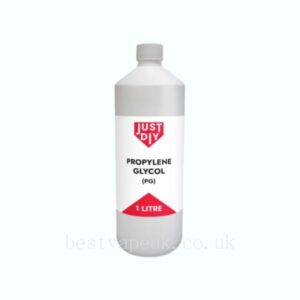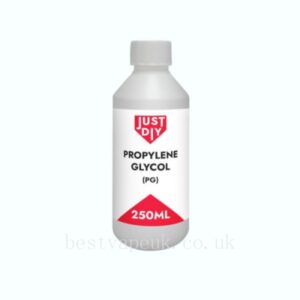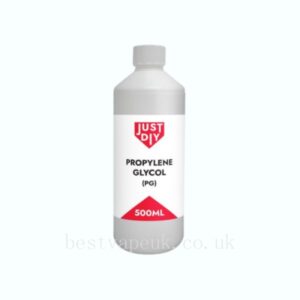Propylene Glycol
Showing all 3 results
-

1L Just DIY Highest Grade Propylene Glycol (PG)
£13.00 -

250ml Just DIY Highest Grade Propylene Glycol (PG)
£5.50 -

500ml Just DIY Highest Grade Propylene Glycol (PG)
£7.50
The Versatile Properties of Propylene Glycol
Propylene glycol, a colorless and odorless liquid, has garnered attention across various industries for its versatile properties. From its applications in food and pharmaceuticals to its role in cosmetics and antifreeze, propylene glycol is pivotal in modern manufacturing processes.
Understanding Propylene Glycol: A Common Ingredient in Various Products
Propylene glycol, often abbreviated as PG, is a clear, odorless liquid that plays a crucial role in various industries, including product formulations. This versatile compound is classified as a humectant, which helps retain moisture, making it a popular ingredient in cosmetics, food products, pharmaceuticals, and more.
Properties and Uses of Propylene Glycol
It is a water-soluble synthetic compound with a slightly sweet taste. In certain applications, it serves multiple purposes, including:
Carrying Flavors: It is an excellent carrier for flavors, ensuring a consistent and enjoyable experience in various products.
Sensation Enhancement: PG contributes to the sensation known as a “throat feel,” mimicking the effect experienced by those transitioning from smoking.
Consistency Control: It helps maintain the right consistency in products, ensuring smooth functionality in devices and efficient performance.
Preservation: PG possesses antimicrobial properties, which help preserve products and prevent the growth of harmful microorganisms.
Health and Safety Considerations
While regulatory agencies such as the FDA generally recognize propylene glycol as safe for approved applications, some individuals may experience sensitivities or allergies to this compound. Potential side effects include throat irritation, dryness, or allergic reactions in sensitive individuals.
Consumers should be mindful of their responses to PG and consult healthcare professionals if they encounter adverse effects when using PG-containing products.
Applications in Pharmaceuticals and Cosmetics
In the pharmaceutical industry, PG is used as a solvent in oral, injectable, and topical formulations. Its ability to dissolve active ingredients ensures effective delivery in a variety of creams, gels, and other preparations. Furthermore, it acts as a carrier for flavors and fragrances, enhancing stability and improving the overall sensory experience.
Propylene glycol is also common in skincare products such as moisturizers, lotions, and creams. Its hydrating properties help retain skin moisture, preventing dryness and irritation. Additionally, PG serves as a solvent, ensuring that active ingredients are effectively delivered to the skin.
Industrial and Commercial Uses
Beyond pharmaceuticals and cosmetics, propylene glycol has extensive applications in industrial and commercial sectors. One of its primary uses is as an antifreeze agent in automotive and HVAC systems. By lowering the freezing point of water, PG helps prevent coolant and system fluids from freezing in cold temperatures, protecting machinery from potential damage.
Additionally, propylene glycol functions as a heat transfer fluid in processes like refrigeration and solar water heating systems. Its high thermal conductivity and low viscosity make it an efficient medium for transferring heat, contributing to the optimization of industrial operations.
Conclusion: Propylene Glycol in Modern Applications
Propylene glycol is a critical component in numerous products, serving essential roles such as flavor carrying, enhancing sensory experiences, consistency control, and preservation. While considered safe for most users, it’s important to monitor potential sensitivities and consult professionals if needed. Understanding the role of PG enables consumers to make informed decisions and enjoy the benefits it brings across various industries.
